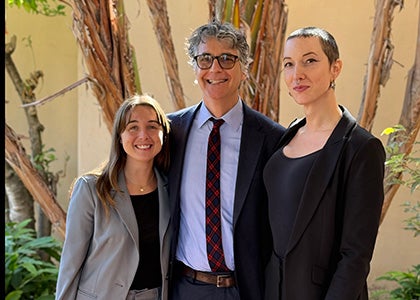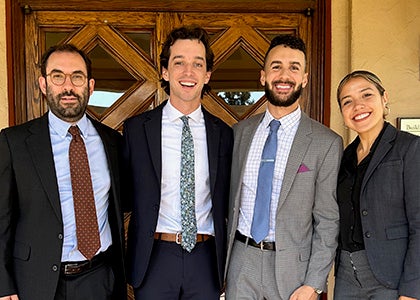Prisoners’ Rights Clinic students go to court and score big wins for their clients

Sylvia Lydon ’25 came to UCLA School of Law with a purpose. Having spent eight years in a Ph.D. program where she taught and wrote about the history and politics of prison abolition and reform, Lydon saw UCLA Law as a place where she could do far more than earn a law degree.
“I came to law school to advocate for incarcerated people,” she says. “I wanted to work more closely with the communities I was teaching and writing about and to have a more direct impact on the lives of people in custody. No experience at UCLA Law has done more to support that mission than the Prisoners’ Rights Clinic.”
Which is what brought her, in the fall of her 3L year, to the Pasadena courthouse of the U.S. Court of Appeals for the Ninth Circuit – and one of the most unexpected, demanding, and rewarding moments of her career so far.
Last November, before a three-judge panel, Lydon and her fellow student Michaela Firmage ’25 delivered oral argument in the case of Avila v. Felder. (Video is available here.) Their client is incarcerated in California and sued for damages and an order for emergency medical treatment after a routine cataract extraction left him in pain and, eventually, blind in one eye.
In certain circumstances and under the supervision of practicing attorneys, certified law students can argue in real court cases. Lydon and Firmage were the latest in a string of UCLA Law students who have gotten to do so. Their presentation to the judges was the culmination of weeks of preparation involving many members of the clinic and their instructors, who included attorneys from the MacArthur Justice Center.
“We had to work extra hard to master the facts, the case law, and the story,” Lydon says. “In the month leading up to the oral argument, we had weekly moot courts with some of the sharpest attorneys and faculty in the field, who were kind enough to grill us relentlessly on every aspect of our case. By the time it came to go before the Ninth Circuit, I knew that there was no one who knew the case better than us.”
The effort paid off. In November, the court sided with their client. (The opinion is available here.) “It was an honor to appear in the court of appeals on our client’s behalf,” says Lydon, who will work after graduation at UnCommon Law as an Equal Justice Works fellow, providing parole preparation and representation to transgender people in California prisons. “Finding out that we had won was just the icing on top.”
‘Prisoner plaintiffs deserve first-rate lawyering’

In the past year, the Prisoners’ Rights Clinic has indeed had a lot to celebrate, including several courtroom appearances and student-driven successes for its clients.
A key offering of UCLA Law’s renowned clinical program, the clinic launched in 2020 and is supervised by Professor Aaron Littman. It allows students to work on civil rights cases that prisoners bring. These matters involve everything from officer brutality to substandard medical care. Working with top appellate and civil rights attorneys, students probe the district court records, research relevant case law, draft multiple briefs, and participate in moot courts.
“Prisoners’ rights cases make up a tenth of all civil litigation filed in federal court. In over 90%, the prisoners are going it alone, without counsel,” Littman says. “In a handful of carefully chosen appeals each year, our students are able to offer their incarcerated clients representation. They learn to grapple with messy records and thorny doctrine, exercise strategic judgment, and write powerful briefs of which any attorney would be proud. They come to understand that prisoner plaintiffs deserve first-rate lawyering, and that — with very hard work — they are capable of providing it.”
Littman has served as the deputy director of the Behind Bars Data Project, for which he shared UCLA’s Public Impact Research Award with Professor Sharon Dolovich, who oversees the Prison Law and Policy Program. He also earned a prestigious Hellman fellowship for his scholarship.
The honors are fitting. Littman’s clinic secured victories in all five of its cases that courts decided in 2024. These resulted in two significant published opinions and included two matters that students argued: Avila and Sheltra v. Christensen.
In Sheltra, a man who is incarcerated in Idaho sued for damages after he was severely beaten by other prisoners despite his repeated warnings to officers that he was being threatened. The district court threw out his case on procedural grounds, faulting him for filing required grievances before, but not after, the attack. At the clinic’s urging, the Ninth Circuit adopted a major new rule, holding that prisoners need not seek administrative remedies again when they are subjected to a continuing violation of their rights. (The opinion is available here.)
Jack Stephens ’24, delivered oral argument in Sheltra last May. (Video is available here.) “It was the highlight of my time at UCLA Law,” he says. “It reaffirmed my gratitude for attending a law school so committed to training and developing prisoners’ rights advocates – and public interest attorneys more generally.” Having graduated since then, Stephens has received a Justice Catalyst fellowship to work at the MacArthur Justice Center in New Orleans.
In addition to offering vital legal services for incarcerated people, the clinic also gives students a significant boost in their practical legal training. For Firmage, going to court for her client in Avila was a prime opportunity to hone some of the lawyering skills that she expects to use as an associate at Keker, Van Nest & Peters in San Francisco after she graduates.
“I entered law school with little confidence in my public speaking skills,” she says. “Preparing for oral argument made me more confident in my ability to think and articulate quickly under stress. Oral argument was honestly very scary, but our preparation was so comprehensive that no questions were of much surprise and muscle memory really kicked in.”
In his career, Joe Gaylin ’24 plans to litigate matters involving prison conditions, and he has been clerking in a federal district court since he graduated. He, too, sees his work in the clinic – where he researched complex law and wrote lengthy briefs in two other cases where the clinic and its clients prevailed – as essential to his future success.
“If I had to choose one experience in law school that prepared me the most for what I want to do, this class was it,” Gaylin says. “Before law school, I was an organizer on the campaign to end the use of solitary confinement in Connecticut state prisons and jails. I knew that I wanted to focus on prison conditions and civil rights work. But it was through this class that I became fascinated with litigation as a tool to work, alongside incarcerated people, to challenge the profound harms engendered by the criminal legal system.”
He adds, “This class is everything that law school should be. It embodies the ideal that the best way to learn is to do. And it certainly gets things done — multiple appellate briefs each semester, the majority of which result in wins! This is the kind of stellar clinical experience that, in my opinion, makes a great law school.”